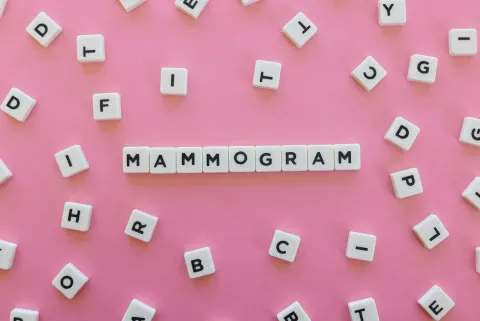Mammogram or Bust

It's a phrase commonly heard about treating cancer. The earlier a cancer is found, the less chance it has to spread and the more opportunity for successful treatment.
Why Do You Need a Screening Mammogram?
Screening mammograms have been proven to be the most effective tool in identifying breast cancer early. Many of these findings appear well before you or your doctor feel a lump or abnormality in your breast. When breast cancer is found early, before it has metastasized (spread) to the lymph nodes or other areas of the body, the five-year survival rate is 98%. Once breast cancer has spread, the five-year survival rate drops to 25%.
What Is a Mammogram?
A mammogram is a low-dose X-ray picture of the breast. Screening mammograms — mammograms performed when someone is experiencing no symptoms — are considered the international gold standard for detecting breast cancer early. In high-risk women additional testing with ultrasound and MRI may be offered to supplement screening mammograms. Monthly breast self-examinations and clinical breast examinations (the manual examination of the breasts by a physician or other trained clinical professional) are also essential tools in detecting cancers. Performing a monthly self-examination allows you to "get to know" your breasts and notice any changes in texture or density that might indicate that something is not right.
What If They "Find Something" on Your Mammogram?
The American Cancer Society reports that about 10% of those who have a mammogram will require more tests, which include additional imaging, an ultrasound or MRI. About 15 to 20% of the recalled women may merit a breast biopsy and 20 to 30% of those biopsied will be diagnosed with a breast cancer. Generally about 75% of biopsies yield a benign result. If a cancer is found, your physician will discuss the treatment options available to you and create a care plan.
When Do You Need To Start Getting Mammograms?
There are multiple recommendations regarding mammograms by different societies. While they all vary on what age to start screening and at what frequency, maximum cancers are detected when screening begins at age 40 (American College of Radiology). Women at high risk begin annual screenings earlier. Physicians might recommend screening at an earlier age if you:
- Are at high risk of breast cancer (genetic susceptibility)
- Have a strong family history (two or more immediate family members) of breast or ovarian cancer
- Had radiation treatment to the chest in the past
What Do You Need To Know Before Having a Mammogram?
- The average mammogram takes about 20 minutes, and discomfort is minimal for most.
- The procedure is safe, with your body receiving just a tiny amount of exposure to radiation.
- Don't wear deodorant, perfume, lotion or powder under your arms or on your breasts on the day of your exam. Foreign particles could show up in an X-ray.
- Let the staff know if you have breast implants. They may need to take more pictures than a regular mammogram.
- Tell the clinic if you have physical disabilities that may make it hard for you to sit up, lift your arms or hold your breath.
- Make sure your past mammogram results are available to whoever will be looking at your new results.
As with all aspects of your health, speak with your physician about what might be best for you. Be sure to discuss your full medical history and that of your family to ensure you make the best decisions possible.
Related A Look at Mammography: 2D vs 3D Breast Health: Is 3D Mammography Right for Everyone? To schedule a mammogram at UMass Memorial Health, call 855-UMASS-MD. We offer convenient locations. Next-day appointments are currently available.
Guest Blogger: Gopal Vijayaraghavan, MD, Breast Imaging, UMass Memorial Health
Note: The content of this blog is for informational purposes only. It is not intended for use as diagnosis or treatment of a health problem or as a substitute for the professional consultation of a physician or qualified health care provider. If you have specific questions or concerns regarding a health or medical condition, contact your physician or a licensed health care professional.

